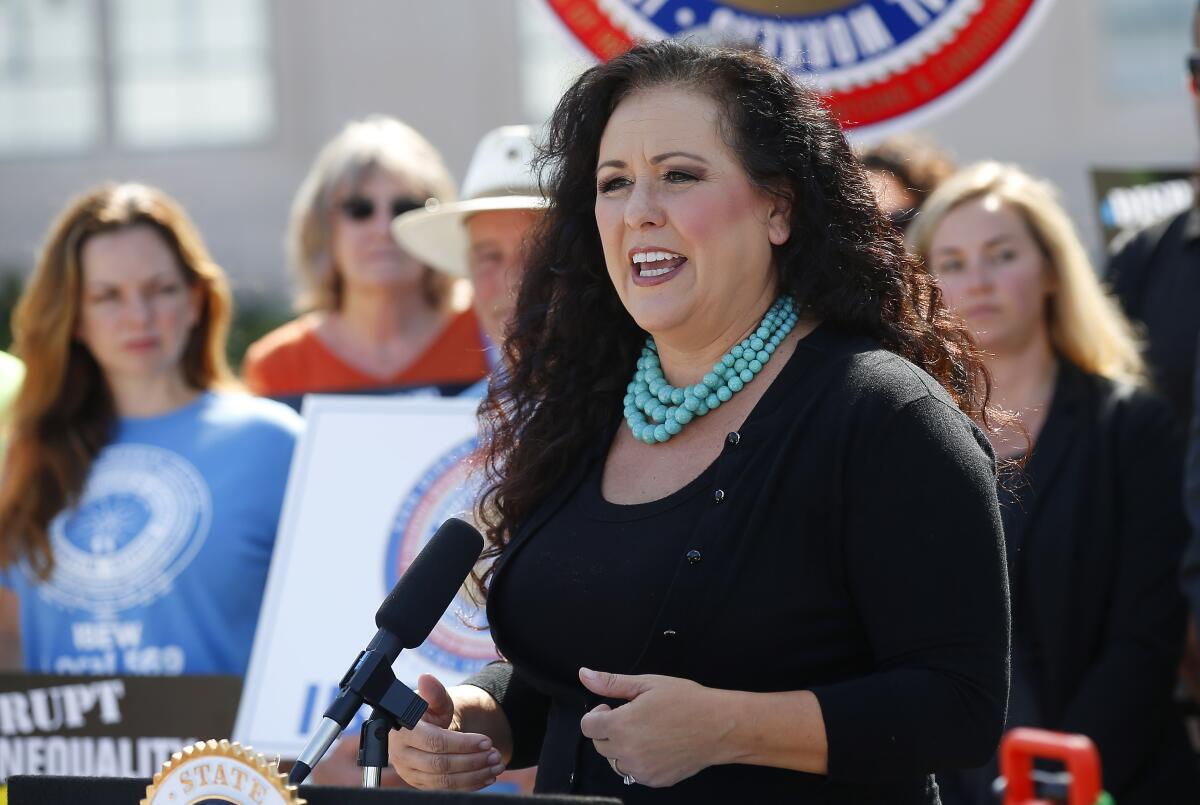Vox Media cuts hundreds of freelance journalists as AB 5 changes loom

- Share via
Since California adopted the new state employment law AB 5 in September, freelance journalists in the state have been scrambling to understand how their livelihoods may be affected after it takes effect Jan. 1. Now some are finding out.
New York-based Vox Media said Monday it would end contracts with hundreds of freelance writers and editors in California who covered sports for the blog network SB Nation as the company came into compliance with the law, which could have forced it to reclassify some of these contractors as employees.
“This is a bittersweet note of thanks to our California independent contractors,” wrote John Ness, executive director of SB Nation, in a blog post.
In 2020, the company will create a new team of SB Nation employees to cover California sports that have largely been covered by independent contractors since 2003. Vox Media will end contracts with about 200 people, including non-California freelancers who cover teams based in the state, and replace them with 20 new part-time and full-time staffers, according to a source familiar with the decision.
AB 5, which was signed into law in September, aims to reduce the number of workers being wrongly classified as independent contractors rather than employees, allowing companies to skirt worker protections such as health insurance benefits and paid sick days.
In a memo to 2,000 SB Nation contractors scattered across the country — most of whom will not be affected by the changes — Ness explained that, under the law, California freelance writers can maintain their status as independent contractors only if they submit no more than 35 pieces per year. Given the pace of sports blogging, many of the writers producing work for SB Nation’s California blogs would easily hit that benchmark, the source said.
Ness wrote in the memo that California contractors were encouraged to apply for full-time or part-time positions. For those who do not snag a job but want to keep contributing, Ness wrote that “they need to understand they will not be paid for future contributions.”
The changes will also affect Curbed and Eater, two other Vox Media sites that employ a handful of freelancers in the state.
Rebecca Lawson, who is based in San Diego and covers the NBA’s Dallas Mavericks, wrote in a blog post Monday that she was told that she could no longer hold a paid position with SB Nation and would be forced to step down as editor in chief of Mavs Moneyball by the end of March.
She wrote that she didn’t blame SB Nation for doing “the easiest thing they can to comply with California law.”
“Personally, while the extra income helps my family, it doesn’t break us to lose it. But I have literally HUNDREDS of amazing colleagues all across our network who DO rely on this money to help, and who are going to have to replace that income somewhere else, somehow. That sucks. So much,” Lawson wrote in the post, which was titled “California’s terrible AB5 came for me today, and I’m devastated.”
But in the view of Lucas Hann, who is based in New York and serves as editor in chief of the Clippers blog, ClipsNation, Vox’s handling of the change reflects issues with the way it treats freelance workers. Hann received an email notifying him of “changes” to his contract a minute after Ness’ blog post was published.
“The reason why there was a need for the law to begin with,” he said, “is because companies like Vox … are not paying people, and they’re using this contractor loophole to get around labor law.”
AB 5 was hailed as a victory by many Uber, Lyft and DoorDash workers who have protested slashed wages and arbitrary terminations, but it has brought fear for some who worry the law means they will have less flexibility in the hours they can work and restrict their ability to work for multiple platforms. Ride-hailing companies that rely on gig labor led opposition to the bill, though the law covers a range of industries across California.
Freelancers also have voiced fears that AB 5 will discourage employers from hiring Californians to avoid additional paperwork and legal liabilities that come with the law, and smaller newspapers and websites may not have the resources to convert freelancers to staff members.
L.A.-based writer Nicole Clark wrote in a Twitter thread in October that it was unlikely AB 5 would force already understaffed publications to create more full-time positions when deprioritizing or letting go of California writers was a much easier and more cost-effective option for many companies. “#AB5 just fundamentally misunderstands how journalism works, and will probably hurt the most vulnerable in our community,” she tweeted.
Emma Gallegos, a freelance writer and editor in Bakersfield, said on Twitter that she studied for a copy editing test over the weekend only to find she didn’t qualify for a job at an unnamed company because she lived in California.
“Add this to the #AB5 pile of rejects. I want to scream,” she tweeted.
Staff writer Jack Harris contributed to this report.
More to Read
Inside the business of entertainment
The Wide Shot brings you news, analysis and insights on everything from streaming wars to production — and what it all means for the future.
You may occasionally receive promotional content from the Los Angeles Times.











